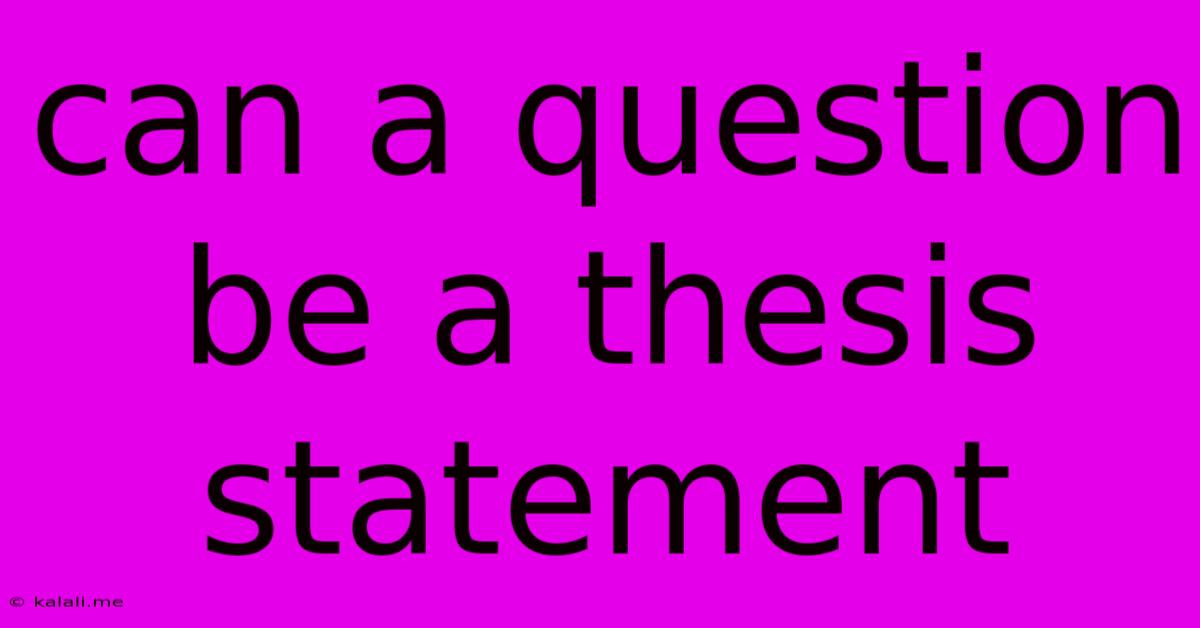Can A Question Be A Thesis Statement
Kalali
Jun 03, 2025 · 3 min read

Table of Contents
Can a Question Be a Thesis Statement? Unlocking the Power of Inquiry in Academic Writing
Can a question serve as a thesis statement? The short answer is: no, not directly. A thesis statement needs to present an arguable claim, a point of view you intend to defend and support throughout your paper. However, a well-crafted question can be an incredibly effective tool in developing a strong thesis statement, and sometimes, it might even appear as part of a broader, more nuanced thesis. This article will explore the relationship between questions and thesis statements, showing you how to leverage the power of inquiry to craft compelling academic arguments.
A strong thesis statement typically answers a significant question within your field of study. It provides a roadmap for your reader, outlining the central argument and the supporting evidence you will present. Think of it as a promise to your reader: "I will prove this point to you." A question, on the other hand, poses a problem or an area of inquiry. It invites exploration rather than making a definitive claim.
Why a Question Isn't a Thesis Statement (on its own)
A question lacks the crucial element of assertion. A thesis must take a stand, offering a specific perspective or interpretation. Consider these examples:
- Question: What are the effects of social media on adolescent mental health?
- Thesis Statement: Excessive social media use is correlated with increased rates of anxiety and depression among adolescents.
The question identifies a topic, but the thesis statement makes a specific claim about that topic. The thesis statement allows for analysis, argumentation, and evidence-based support. The question simply invites further investigation.
How Questions Help Craft Powerful Thesis Statements
While a question cannot stand alone as a thesis, it's a vital starting point for your research and writing process. A well-formulated question can guide your research, helping you to:
- Focus your research: A strong research question helps you narrow your focus, preventing you from straying off course.
- Identify key arguments: Exploring a central question will uncover potential arguments and counter-arguments.
- Develop a clear structure: Addressing the question in a logical, structured way helps organize your paper.
Using Questions within a Thesis Statement
Sometimes, you might incorporate a question directly into your thesis statement, especially when aiming for a more sophisticated and nuanced argument. This usually happens when your thesis statement acknowledges complexities or explores multiple perspectives:
- Example: While the question of whether AI will surpass human intelligence remains hotly debated, this paper argues that the current focus on raw processing power overlooks the crucial role of emotional intelligence and creative problem-solving in true intelligence.
Here, the question is incorporated to acknowledge a wider debate, thereby strengthening the originality and relevance of the presented argument. This approach requires careful wording to ensure clarity and a strong central claim.
In Conclusion: Questions as a Stepping Stone
In conclusion, a question alone cannot function as a thesis statement. A thesis statement requires a clear, arguable claim. However, questions are essential tools in the thesis-writing process. They help to refine your research focus, unearth compelling arguments, and even enhance the sophistication of your final thesis statement. By strategically employing questions throughout the research and writing process, you can unlock the power of inquiry to craft compelling and well-supported academic arguments.
Latest Posts
Latest Posts
-
How To Get Cat Urine Out Of Wood Floors
Jun 05, 2025
-
Can I Add Oil To My Car Without Changing It
Jun 05, 2025
-
Why Is Snape Called The Half Blood Prince
Jun 05, 2025
-
How Do I Get Rid Of Tea Stains In Cups
Jun 05, 2025
-
Teenage Mutant Ninja Turtles In A Half Shell
Jun 05, 2025
Related Post
Thank you for visiting our website which covers about Can A Question Be A Thesis Statement . We hope the information provided has been useful to you. Feel free to contact us if you have any questions or need further assistance. See you next time and don't miss to bookmark.